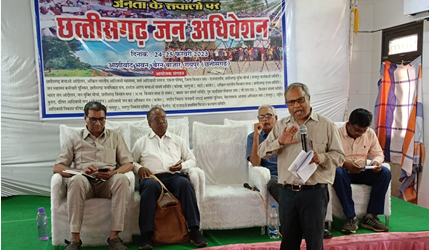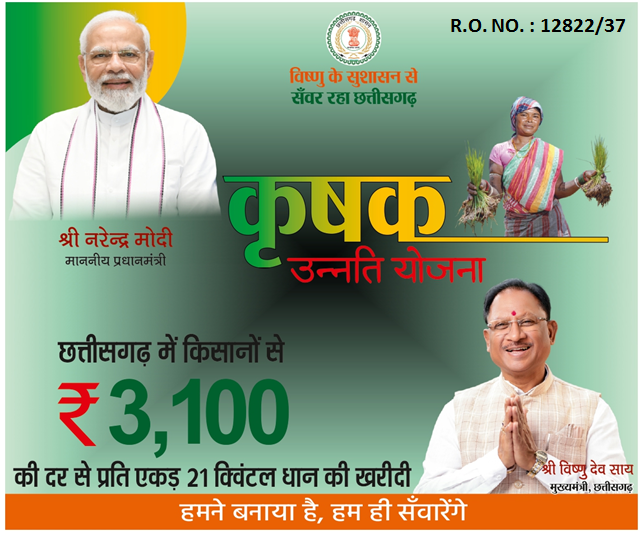Raipur (thestates.news)| Parallel to the ongoing 85th Congress Mahadhiveshan, more than 25 people’s organizations working among tribals, farmers, laborers, Dalits, homeless, women and marginalized sections in Chhattisgarh organized a joint Jan-adhiveshan in Old Raipur on February 25-26, on the challenges and questions facing the general public of the state, which attracted the attention of the national media also. Divided into six sessions over two days, this adhiveshan was also addressed by journalists and writers such as Nandini Sundar, Jean Dreze, Pranjoy Guha Thakurta and Ram Puniyani. In these sessions, more than 300 workers associated with these organizations registered their participation, who have raised questions on the anti-people policies of Congress-BJP and made a clear declaration to fight communalism along with the fight to save their livelihood. .

The Jan-adhiveshan was inaugurated by former Union Minister Arvind Netam. Now-a-days he is actively participating in the ongoing struggles of tribals in Bastar against the plunder of natural resources. He said that today in the era of liberalisation, the biggest threat is to the tribals’ land and the government is not ready to follow the laws it has made to grab it. He said that laws are made for corporates in a month, but in Chhattisgarh rules for PESA, passed in parliament in 1995-96, have been made after 25-26 years and through these rules, the rights of the village-society and the spirit of the law have been just abolished. He said that today agitations are going on at 16 places in Bastar against the loot of natural wealth, government-sponsored mass killings are taking place, but the home minister of our state has not the time to visit Bastar during his four-year rule. There is a contradiction between the tribals and the police in Bastar, but the whole administration is running on the strength of the police, which is bent on destroying the tribals instead of development. He stressed that it is only democratic organizations that are raising the voice of tribals today.
After the inauguration of the adhiveshan, sessions on the topics like “Recognition of rights on forest land in Chhattisgarh and status of implementation of PESA” (Chairman: Ramesh Bhai, Ekta Parishad), “Agrarian crisis and struggle for rights on land” (Chairman: Sanjay Parate, Chhattisgarh Kisan Sabha), “Attack on Constitutional and Democratic Rights, Violation of Human Rights, Militarization and Media Freedom in Chhattisgarh” (Chairman: Nandini Sundar, Professor, Delhi University), “Loot of Natural Resources and Violation of Pro-people Laws in Chhattisgarh” ( Chaired by: Pranjoy Guha Thakurta, Senior Journalist), “Communal Polarization in Chhattisgarh” (Chairman: Ram Puniyani) and “Right to Education and Healthcare Versus Privatization: Promises made to Labourers, Daily Wages and Contractual Workers and their Status” ( Chaired by: Jean Dreze, Economist) were held. The activists affiliated to Chhattisgarh Bachao Andolan, All India Adivasi Mahasabha, Sarv Adivasi Samaj, Ekta Parishad, Rajnandgaon jila Kisan sangh, Chhattisgarh Mukti Morcha (Majdoor Karykarta Samiti), Jan Swasthy Karmchari Union, Chhattisgarh Vanadhikar Manch, Hasdev Aranya Bachao Sangharsh Samiti, Mati, All India Kisan Sabha, Jan Mukti Morcha, Guru Ghasidas Sevadar Sangh, Bharat Jan Andolan, Chhattisgarh Kisan Sabha, Bastar Jan Sangharsh Samiti, Nai Rajdhani Prabhavit Kisan Kalyan Samiti, Kisan Sangharsh Samiti, Dalit-Adivasi Manch, Adivasi Jan Van Adhikar Manch, Nagariya Kamgar Nikay Safai Kamgar Union, Mehanatkash Awas Adhikar Sangh, Jashpur Jila Sangharsh Samiti, Adivasi Vikas Parishad, Jashpur Vikas Samiti, Richaria Campaign, Sitanadi Udanti Sangharsh Samiti, Koya Bhumkal Kranti Sena, Mitanin , Workers associated with organizations like Rasoiya and Anganwadi Workers Association delivered their views.
In course of addressing these sessions, Pranjoy Guha Thakurta narrated the story of making of Adani, from a small scale industrialist to the number two richest man in the world and the contribution of modi in this process. He said that the Hindenburg report clearly shows how this wealth was amassed through forgery and this report has shaken the foundation of Adani’s economic empire.
Nandini Sundar told the issue of Jal-Jangle-Jameen as the root cause of Bhumkal movement of 1910 in Bastar. She said that the legal framework of our country is undemocratic, which does not help the tribals in fighting for their rights. She said that the way tribals are falling victim to the ‘project of Hindutva’, their existence is in danger.
In his online address, Ram Puniyani said that in the olden days the fight between the feudal lords was not for religion, but for power and wealth. After independence, the old feudal classes were not abolished in our country, due to which capitalism could not develop fully. Communal politics is an expression of this, due to which the values, that flourished during the freedom movement, have come under threat. If communal politics emerges victorious in this struggle, then our objective base as a nation will be destroyed and the unity and integrity of the country will be in danger. Citing the examples of Sri Lanka and Pakistan, he said that wherever there is politics in the name of religion, economic development gets stalled and India will not be an exception.
Jean Dreze outlined that democracy in capitalism is also for profit. Today such companies have come up, which take contracts to influence elections in any country. He said that Hindutva is a Brahminical project to use religion politically and the RSS-BJP is trying to create a casteist society with upper caste dominance based on Manuvad. Emphasizing the struggle for equality, he said that it would be difficult to maintain political democracy without establishing socio-economic equality.
Discussing in the above sessions, Kisan Sabha leader Sanjay Parate spoke about the rising cost of agriculture, falling income in the absence of remunerative support price and increasing suicides of farmers and farm laborers due to indebtedness. He said that on an average 40 suicides are taking place in Chhattisgarh every year in one lakh farmer families, which is the highest in the country. The acquisition of land in the name of new development projects and handing over of this land to private companies has further aggravated the crisis.
In another session, he attacked on the communal policies of the Modi government and the ‘soft Hindutva’ policy of the Congress. He said that this strategy of Congress weakens the ideological firmness, scientific approach and rationality of the citizens towards secularism. Due to this, the Sanghi gang has got an opportunity to divide the tribals in the name of religious conversion.
Vijay Bhai of Bharat Jan Andolan said that there is inequality in the structure of democratic governance in the country. Today both BJP and Congress have forgotten the slogan of decentralization of power and the federal structure of the country is being violated. Social activist Bela Bhatia explained in detail about the adverse effects of indiscriminate militarization of Bastar on the tribals there. He stressed on the need to create peace in Bastar through political dialogue. Ramesh of Maharashtra’s Satya Shodhak Mandal underlined the ill-effects of privatization in the education and health sector, which has resulted in the closure of thousands of schools in tribal areas in Maharashtra, pushing millions of children out of education. In Chhattisgarh too, about 3000 schools have been closed in tribal areas. Advocate Shalini Gera told how tribals are being made victims of fake encounters in the name of Naxalites and reports of inquiry commissions are being suppressed.
In the Jan-adhiveshan, Sudesh Tikam emphasized the unity of food-dependent and forest-dependent farmers, while Sarju Tekam said that India cannot become a Hindu nation as long as even a single tribal is alive in Bastar. He said that it is not necessary to be a Maoist to get shot in Bastar, just being a tribal is enough. Lalsu Nagoti of Narayanpur, journalist and activist Mangal Kunjam of Dantewada and Umeshwar of Hasdeo Aranya told how gram sabhas are being faked and police camps are being set up with the District Mineral Fund. Prashant Jha of Korba elaborated on the ongoing struggles for employment and rehabilitation of displaced villagers against the land grab policy of SECL. He told that because of these conflicts, SECL had to change the rules of its employment policy. There, for the last 500 days, the land displaced people are protesting against the anti-employment policies of SECL. Keshav Shorey said that paramilitary forces are being misused to grab iron ore in Narayanpur district and tribal culture, identity and their rights are being crushed. Rajim Ketwas said that the forest rights of women are not considered. Plantation and fencing are being done on the forest rights land, due to which women are not able to bring forest produce from there. Akhilesh Edgar briefed about the recent attacks on Christian tribals by the Sangh-BJP in Narayanpur and Kondagaon districts of Chhattisgarh and the inaction of the Congress government and its administration.
By adopting a manifesto and emphasizing on the solidarity of the masses, the Jan Adhiveshan has expressed its resolve to intensify the struggle against communalism along with the fight to save livelihood and natural resources.











